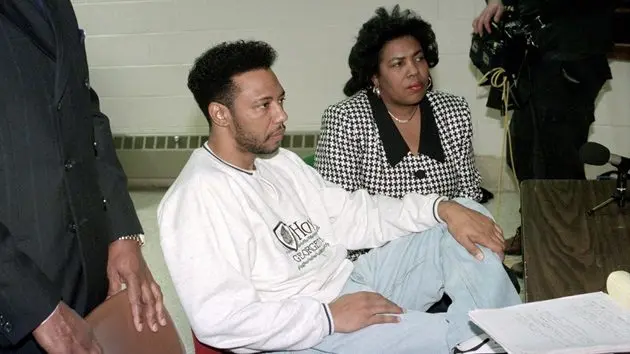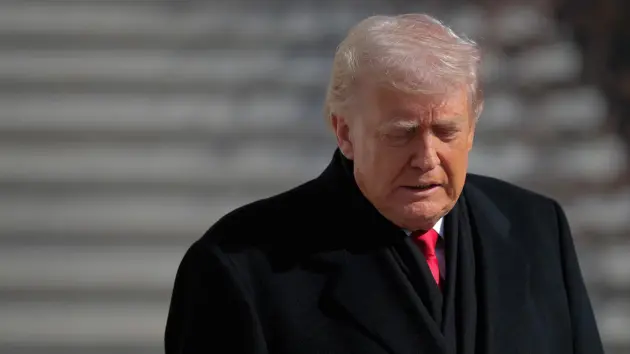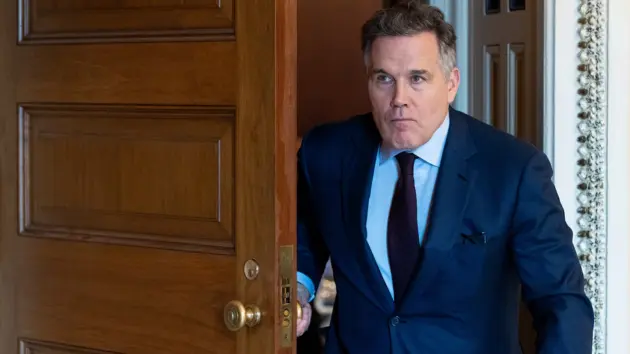
(CHICAGO) — For 23 hours a day, Larry Hoover, the founder of notorious street gang Gangster Disciples, had been sitting in a 7-by-12-foot concrete cell at the ADX Florence federal supermax facility in Colorado, where he spent 27 years in almost complete isolation, according to his attorneys.
Earlier this year, President Donald Trump commuted his federal life sentence, ending nearly three decades of federal confinement.
Hoover, 74, remains imprisoned under a separate Illinois state sentence, an up-to-200-year term stemming from a 1973 murder conviction.
Since that transfer to the Colorado State Penitentiary earlier this year, his attorneys say, Hoover has suffered three heart attacks while performing prison labor, the most recent in September. They describe, in a newly filed legal petition with the prison board, his condition as fragile and his treatment as “a slow, state-sanctioned death sentence.”
Hoover’s lawyers are asking Illinois Gov. JB Pritzker to do what the federal government has already done, recognize his transformation and grant Hoover a chance to live out his remaining years in freedom.
Hoover founded the Gangster Disciples on Chicago’s South Side in the late 1960s. In 1973, he was convicted on state charges of ordering the murder of William “Pooky” Young, a 19-year-old drug dealer accused of stealing from the gang. Hoover was sentenced to 200 years in prison under Illinois’ former indeterminate sentencing system.
In 1997, following a 17-year federal investigation, Hoover was convicted on 40 counts including drug conspiracy and racketeering for allegedly directing gang activity from prison. He was sentenced to six life terms, sentences that President Donald Trump commuted earlier this year.
On Wednesday, Hoover’s attorney, Justin Moore of the Stafford Moore Law Firm, filed a 39-page petition for clemency, obtained exclusively by ABC News. His plea now rests with the Illinois Prisoner Review Board and Pritzker.
Ron Safer, who served as the former lead federal prosecutor in Hoover’s 1997 conviction, told ABC News’ Chicago station WLS that he was disappointed Hoover was granted federal clemency.
“I believe in redemption. I believe in rehabilitation. I believe in mercy. There are some crimes that are so heinous, so notorious, that they’re not deserving of mercy,” Safer said. “If Larry Hoover said there was going to be a killing, there was a killing.”
Wednesday’s filing argues that Hoover’s continued imprisonment, given his age, health and decades of rehabilitation, no longer serves justice or public safety.
At the heart of the filing are Hoover’s words, breaking his silence for the first time in 25 years in two deeply personal letters to an as-yet-assigned judge and to the public, offering a window into his remorse, aging and reckoning.
“People, when writing about me in the papers, always use photos of me depicting the way I appeared 40 years ago, as if I’m still a young, strong and rebellious gang leader. That man no longer exists,” Hoover wrote in a typed letter to the judge. The letter is undated.
“I am no longer the Larry Hoover people sometimes talk about, or he who is written about in the papers, or the crime figure described by the government,” he wrote. “That man has over these many years transformed into the man I am today. It is true that some men never learn, or that prison makes some into monsters; I’ve seen it, but for me, over time, prison — this prison in particular — became a place of reflection.”
In a separate and also undated letter addressed to the public, Hoover wrote, “I have come to realize that with my silence over these years I have done myself a grave disservice.”
“I have been involved, and in fact, had initiated, I cannot avoid taking responsibility. With this responsibility, now being able to honestly assess and appreciate the magnitude and scope of the harms my actions had wrought, I cannot help but to have immense remorse,” Hoover wrote.
In his letter, Hoover expressed deep remorse for the harm his past actions caused, saying he had wasted his talents on choices that hurt his Chicago, his community and society. He emphasized that he has long renounced all ties to the Gangster Disciples and any form of criminal activity, declaring that he wants nothing to do with that life “now and forever.”
After more than five decades in prison, including over 25 years in isolation, Hoover said, there is no chance he would reoffend, noting that most men his age devote their final years to steering others away from crime. He said he hopes to spend his remaining time honoring a promise he made to his late mother not to waste his final years.
His letters center on a petition written by his lawyers and filed on his behalf that portrays a man shaped by decades of confinement, failing health and personal reckoning. His attorneys argue that half a century behind bars has already fulfilled the purpose of punishment and that his rehabilitation stands as proof of transformation.
Hoover’s lawyers note that he has not committed a serious infraction during his decades in prison and has completed more than 100 educational and rehabilitation programs.
“My father has suffered multiple heart attacks from being forced to perform hard labor despite his age and medical condition,” said his son, Larry Hoover Jr., in a statement to ABC News “All he wants now is to come home, spend what time he has left with his family, and use his experience to help bring peace to the same communities he once came from.”
The filing also details what Hoover’s attorneys said were the stark conditions of his confinement and his deteriorating health. ABC News has contacted prison officials for comment.
Hoover is one of just 35 people still incarcerated under Illinois’ pre-1978 indeterminate sentencing system, which left prisoners with open-ended “C-numbers” and no release date except at the discretion of the review board, according to the filing. His lawyers note that Hoover’s co-defendant in the 1973 case, Andrew Howard, was paroled more than 30 years ago, a disparity his lawyers cite as evidence of continued punishment without purpose. Both were accused of murder and Howard was convicted of carrying out the killing.
The Illinois Parole Board, in it’s decision to deny Hoover’s release in 2022, stated, “The Board feels that parole release at this time would not be in the interest of public safety, as there is a substantial risk that Mr. Hoover would not conform to reasonable conditions of parole release, and that parole release at this time would deprecate the serious nature of the offenses and promote a lack of respect for the law.”
The new petition for his release revisits Hoover’s early life in Chicago’s South Side, describing a boy shaped by poverty, segregation, and systemic neglect.
“From his bedroom window as a child,” the filing states, “he saw drug deals, prostitution, fights, stabbings, and shootings. His daily reality was the theater of urban abandonment.”
One of his attorneys, Justin Moore, wrote in the petition, “Hoover did not create the fire. He grew up in it.”
Hoover’s story has drawn attention far beyond Chicago. In 2021, rappers Kanye West and Drake set aside their long-running feud to headline the “Free Larry Hoover” benefit concert in Los Angeles, calling attention to criminal justice reform and urging compassion for aging inmates like Hoover. West, a Chicago native, had previously advocated for Hoover’s release during a 2018 meeting with Trump in the Oval Office.
That public support has continued to grow. Among those backing Hoover’s clemency bid are civil rights leaders Jesse Jackson Sr. and the Rev. Al Sharpton, Rep. Jonathan Jackson, Chance the Rapper, Judge Greg Mathis, and Pulitzer Prize-winning journalist Yohance Lacour and former U.S. Secretary of Education Arne Duncan.
Also lending support is Alice Marie Johnson, Trump’s current White House pardon czar, who also serves as CEO of Taking Action for Good. Johnson wrote in a letter in the filing to the Illinois review board that Hoover is repentant and has the potential and the desire to live the rest of his life as a force for good in his community. She added that if he were released, she would personally help support his reintegration into society.
Rep. Jonathan Jackson expanded on that theme in a statement released by his office supporting clemency, questioning “whether continued imprisonment serves the public interest — or whether compassion is now the more just response.”
Hoover’s petition now rests with Pritzker and the Illinois board, which reviews clemency cases and can make recommendations to the governor.
Pritzker did not offer a comment following Trump’s commutation order, but has met with family and supporters of Hoover. A spokesperson for Pritzker’s office did not immediately respond to ABC News’ request for comment.
The filing lands at a time of renewed friction between Trump and Pritzker, whose relationship has long been strained over the COVID-19 pandemic, immigration and public safety policy in Illinois. In recent months, the two have clashed over ICE enforcement in Chicago, with Trump accusing Pritzker of “failing to protect” federal officers, while Pritzker has described Trump’s tactics as “acts of aggression against our people.”
Detractors, including some former prosecutors, law enforcement officials and community anti-violence advocates, argue that Hoover’s release could reopen wounds in Chicago neighborhoods still scarred by gang violence.
They maintain that, despite his renunciations, Hoover’s name still holds symbolic power among some Gangster Disciples factions.
Chicago FBI Special Agent in Charge Doug DePodesta said in a statement to WLS in Chicago in May that “Larry Hoover caused a lot of damage in Chicago. He was also convicted on state charges and is likely to continue serving time in state prison where he belongs.”
His supporters counter that his transformation and the decades he has already served show a man committed to peace, not power.
In his own words, Hoover wrote, “I want my legacy to be peace. I want my name to mean growth, not destruction. I want to be remembered not as who I was, but as who I fought to become.”
Copyright © 2025, ABC Audio. All rights reserved.



